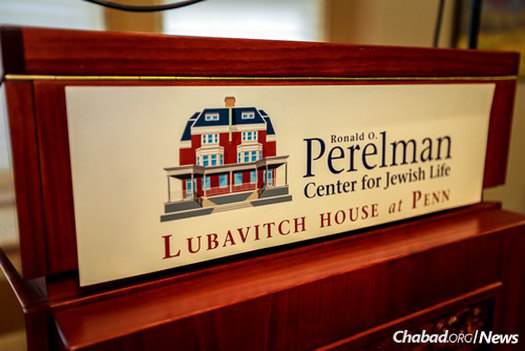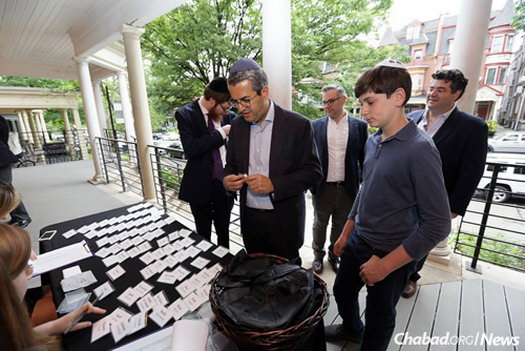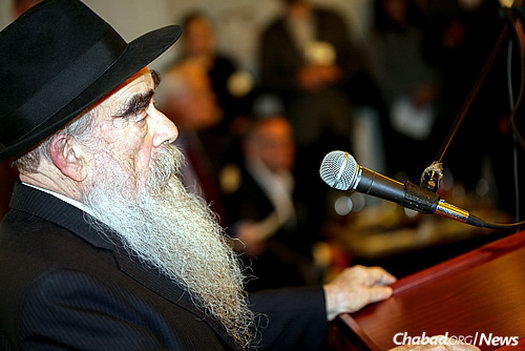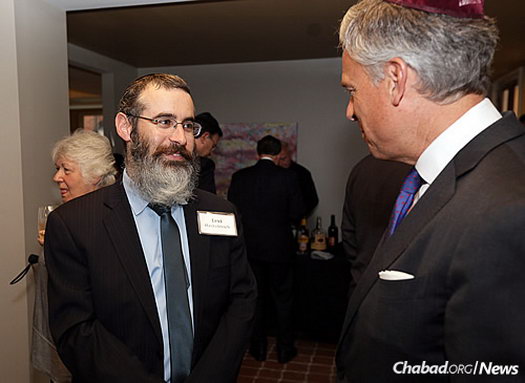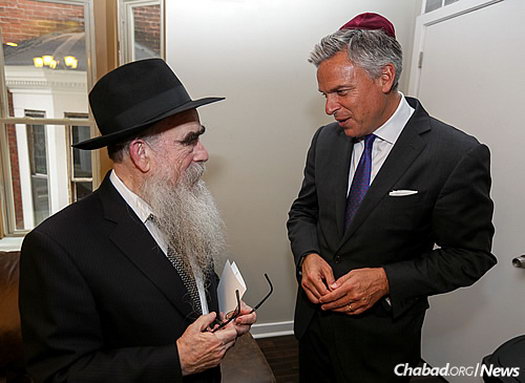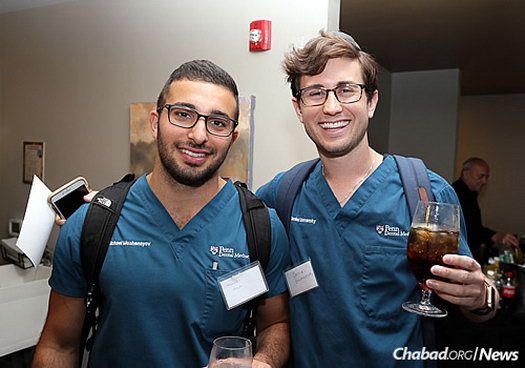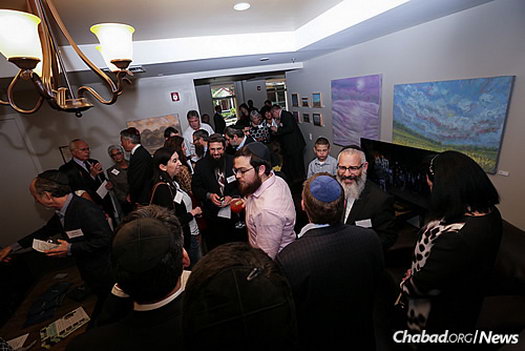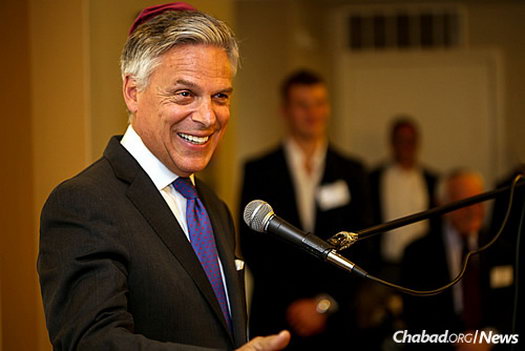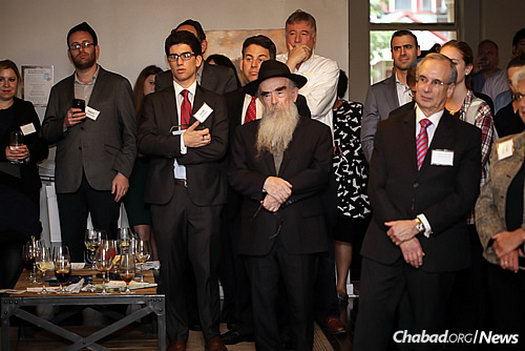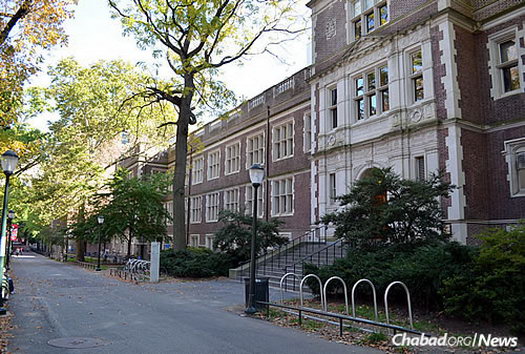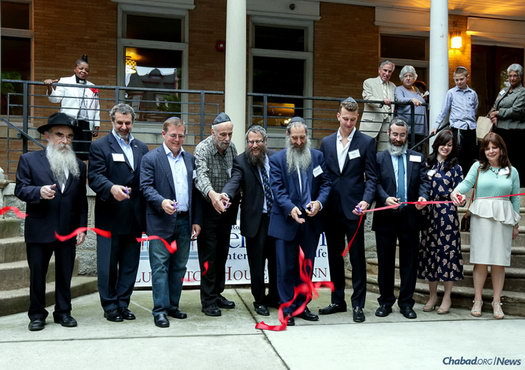
Pioneering Chabad at UPenn Celebrates New Building
by Reuvena Leah Grodnitzky – Chabad.org
Cloudy skies couldn’t put a damper on the early-evening ribbon-cutting and building dedication of the Ronald O. Perelman Center for Jewish Life-Lubavitch House at the University of Pennsylvania. Dozens of alumni, supporters, community members and rabbis gathered on June 16 to be a part of the celebration that was more than 10 years in the making.
“This new center is a reminder of the seed that the Lubavitcher Rebbe [RabbiMenachem M. Schneerson, of righteous memory] planted 55 years ago, when I first came to campus to begin teaching Torah classes in 1962,” said RabbiAvrohom Shemtov, director of the Philadelphia Lubavitcher Center. “Chabadat UPenn was the first set program at a college campus, though today Chabad on Campus is considered a normal facet of Jewish outreach.”
Perelman, of Revlon cosmetics fame and the building’s namesake, is a product of those first encounters on campus. A graduate of the university’s Wharton School of Business, he met Shemtov some 40 years ago, and hardly a day has passed since that the two haven’t conducted a learning session by phone, he said.
“I’m so happy to support a center where ‘every Jew is family,’ and where Jews of all backgrounds can come together to worship, celebrate and explore their heritage in a warm environment,” said Perelman in a letter that Shemtov read at the event. “Faith plays an enormous role in my life, and it’s my privilege and obligation to give back to others. I hope that Chabad will continue to enrich student life at UPenn with wisdom, understanding and knowledge.”
Event co-chairs were Eric Gribetz, Ilan Kaufthal and David Magerman.
‘A Central Place’
According to Rabbi Ephraim Levin, director of Lubavitch House at Penn, the new center is a renovation of an original building that was more than 100 years old. The first half of the building, purchased in 1980, could host a maximum of 40 guests for Shabbat and holidays, and was in use until renovations began. With the acquisition of the second side of the building in 2005, the $5 million renovation project launched in full force, seeking to increase its capacity from 12,000 square feet to 25,000 square feet, and boost the seating to accommodate 120 guests.
“UPenn is a central place in terms of American leaders that emerge from there, including people who have come from our Chabad House,” said Rabbi Menachem Schmidt, executive director of Lubavitch House at Penn, who moved to campus in 1980 with his wife, Chava. “The new facility will enable us to have a larger variety of programs and has already made a difference in terms of holding even better programming. This is only the beginning: We look forward to increasing what we’re doing in many different ways.”
Approximately 3,500 Jewish undergraduate and graduate students attend the university, according to Levin, out of a total student body of more than 24,000.
The first floor of the building contains a social hall—for meals, conferences, speakers and meetings—as well as the Bait Yaakov, Safra Family synagogue and library. The basement boasts a lounge, which will soon be converted into a coffee-shop-like food establishment to supplement the campus’s kosher-meal plan, by making kosher food available on nights and weekends. There are also plenty of offices upstairs, in addition to student dormitory housing—a three-bedroom space and eight studio apartments—with a separate entrance from the outside.
“The various features of the new building represent how our Chabad House provides something for every Jew,” said Levin, who moved to the campus in 1990 with his wife, Flora. “We are able to provide experiences that are positive and meaningful for all levels of interest, from learning and classes, to hospitality for Shabbat and holidays, to our Jewish Heritage Program (JHP) internships and Birthright Israel trips.”
Rabbi Levi and Nechama Haskelevich, the campus rabbi couple at Lubavitch House at UPenn, lead a 40-student Birthright trip every year and engage some 50 students in weekly learning opportunities. And JHP organizes some 2,000 students across campus to participate in a Shabbat meal in their own living spaces twice a year.
“We have already seen an increase in attendance at the Chabad House since moving into the new space. Students really appreciate the large and beautifully appointed interior; they enjoy hanging out with friends, relaxing and studying,” said Nechama Haskelevich, who moved to campus in 2000 with her husband. “We are also able to hold multiple events simultaneously, which is only increasing our reach on campus, and we look forward to continuing to grow our activities here at Penn.”
For fourth-year medical student Miranda Rosenberg, the new building has been the ideal location for her connection to Chabad.
“It’s gorgeous,” said Rosenberg, who is originally from South Florida and has been involved with Chabad since her undergraduate days at Harvard University. “I know that it will be incredible for our community in that it’s such an open, welcome space.”
Ashley Friedman, who studies law at Temple University, participates in young-professional events through JHP. Of the new development, she said: “I think it’s a beautiful building. It’s a great place for people to come for Jewish events and is in a central location on campus. It’s a wonderful place for people to meet each other.”
‘A Center of Tranquility’
To show support for the grand opening, University Chaplain Rev. Charles L. Howard brought greetings from the school’s president, Amy Gutmann, in which she called Chabad at UPenn “a pioneering model for Chabad on Campus,” adding that the new building will enable Chabad to make an even “fuller contribution to religious life at Penn.”
Howard, himself a Penn graduate, emphasized that he “sees humanity at its best at Lubavitch,” and hopes that Chabad will continue to “bring the sweet spirit of joy to Penn’s campus.”
The event’s keynote speaker Jon Huntsman Jr.—former governor of Utah, and a U.S. ambassador for Singapore and China—spoke of the impact Chabad has on the University of Pennsylvania, his alma mater.
“This is a center of tranquility that represents understanding, respect and tolerance,” said Huntsman, a Utah native. “There is a respect for others here that transcends all boundaries. Chabad is home for people looking for a place of respite, where they can connect. This place represents the best of the community.”

